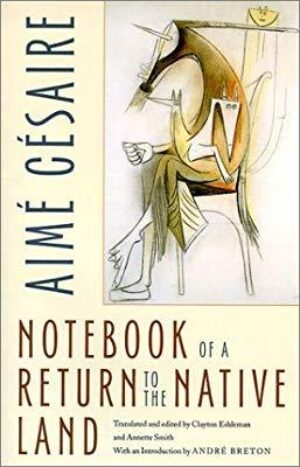In Their Own Words
A. James Arnold and Clayton Eshleman on the original 1939 translation of “Notebook of a Return to the Native Land” by Aimé Césaire
A NOTE ON THE ORIGINAL 1939 NOTEBOOK OF A RETURN TO THE NATIVE LAND
Here are the first twenty strophes of our translation of Aimé Césaire's 1939 Notebook of a Return to the Native Land. This 725 line poem is a work of immense cultural significance and beauty. To date commentary on it has focused on its Cold War and anticolonialist rhetoric, material that Césaire only added to the revised 1956 text which turns out to be the fourth, and until now, primarily known version of the work.
Since 1956, readers of Césaire's masterwork have had to wrestle with what is, in effect, a palimpsest. On three occasions after the poem's first publication in the literary journal "Volontés" on the eve of World War II, the poet revised the carefully composed original text in a new spirit and with different aims. In 1947, the Paris bookseller Brentano's, which published in New York City during the war, brought out the first book edition of the poem with an English translation by L. Abel and Y. Goll prefaced by André Breton's essay, "A Great Negro Poet." A few weeks later, Bordas, in Paris, brought out a third edition based on a different (no longer extant) typescript.
Whereas the two 1947 editions were revised exclusively by the addition of new elements to heighten certain effects, the 1956 edition published by Présence africaine in Paris (until now taken to be the definitive text) excised much of the earlier additions and substituted for them blocks of text that would align the poem with the poet's new political position, one which embraced the immediate decolonization of Africa in militant tones. Most notably the visible traces of a spiritual discourse were obliterated, and the sexual metaphors that characterized carnal passages addressing the speaker's union with nature were replaced by new material that introduced an entirely new socialist perspective focused on the wretched of the earth.
Our intention in offering the 1939 French text of the Notebook, translated for the first time into English, is to strip away decades of rewriting that introduced an ideological purposed absent from the original. We do not claim to reveal what the poem ultimately means but rather how it was meant to be read in 1939. Reading with the poem's first audience, so to speak, will finally permit a new generation to judge its enduring power a century after the poet's birth.
—November 2012
* * *
An excerpt from
NOTEBOOK OF A RETURN TO THE NATIVE LAND translated by A. James Arnold & Clayton Eshleman
1
At the end of first light burgeoning with frail coves the hungry Antilles, the Antilles pitted with smallpox, the Antilles dynamited by alcohol, stranded in the mud of this bay, in the dust of this town sinisterly stranded.
2
At the end of first light, the extreme, deceptive desolate eschar on the wound of the waters; the martyrs who do not bear witness; the flowers of blood that fade and scatter in the empty wind like the cries of babbling parrots; an aged life mendaciously smiling, its lips opened by vacated agonies; an aged poverty rotting under the sun, silently; an aged silence bursting with tepid pustules
3
the dreadful inanity of our raison d'être.
4
At the end of first light, on this very fragile earth thickness exceeded in a humiliating way by its grandiose future—the volcanoes will explode,* the naked water will bear away the ripe sun stains and nothing will be left but a tepid bubbling pecked at by sea birds—the beach of dreams and the insane awakening.
5
At the end of first light, this town sprawled—flat, toppled from its common sense, inert, winded under its geometric weight of an eternally renewed cross, indocile to its fate, mute, vexed no matter what, incapable of growing according to the juice of this earth, encumbered, clipped, reduced, in breach of its fauna and flora.
6
At the end of first light, this town sprawled—flat…
And in this inert town, this squalling throng so astonishingly detoured from its cry like this town from its movement, from its meaning, not even worried, detoured from its true cry, the only cry one would have wanted to hear because it alone feels at home in this town; because one feels that it inhabits some deep refuge of shadow and of pride, in this inert town, this throng detoured from its cry of hunger, of poverty, of revolt, of hatred, this throng so strangely chattering and mute.
7
In this inert town, this strange throng that does not huddle, does not mix; clever at discovering the point of disencasement, of flight, of dodging. This throng that does not know how to throng, this throng, one realizes, so perfectly alone under the sun, like a woman one thought completely occupied with the lyric cadence of her buttocks, who abruptly challenges a hypothetical rain and enjoins it not to fall; or like a rapid sign of the cross without perceptible motive; or like the sudden grave animality of a peasant, urinating standing, her legs parted, stiff.
8
In this inert town, this desolate throng under the sun, not connected with anything that is expressed, asserted, released in broad earth daylight, its own. Not with Josephine, Empress of the French, dreaming way up there above the nigger scum. Nor with the liberator fixed in his whitewashed stone liberation. Nor with the conquistador.* Nor with this contempt, nor with this freedom, nor with this audacity.
9
At the end of first light, this inert town and its beyond of lepers, of consumption, of famines, of fears crouched in the ravines, of fears perched in the trees, of fears dug in the ground, of fears adrift in the sky, of piled up fears and their fumeroles of anguish.
10
At the end of first light the morne* forgotten, forgetful of exploding.
11
At the end of first light the morne in restless, docile hooves—its malarial blood routs the sun with its overheated pulse.
12
At the end of first light the restrained conflagration of the morne, like a sob gagged on the verge of a bloodthirsty burst, in quest of an ignition that slips away and ignores itself.
13
At the end of first light, the morne crouching before bulimia on the outlook for tuns and mills, slowly vomiting out its human fatigue, the morne solitary and its blood shed, the morne bandaged in shade, the morne and its ditches of fear, the morne and its great hands of wind.
14
At the end of first light, the famished morne and no one knows better than this bastard morne why the suicide* choked with a little help from his hypoglossal jamming his tongue backward to swallow it; why a woman seems to float belly up on the Capot River* (her chiaroscuro body submissively organized at the command of her navel) but she is only a bundle of sonorous water.
15
And neither the teacher in his classroom, nor the priest at catechism will be able to get a word out of this sleepy little picaninny, no matter how energetically they drum on his shorn skull, for starvation has quicksanded his voice into the swamp of hunger (a word-one-single-word and we-will-forget-about-Queen-Blanche-of-Castille,* a word-one-single-word, you-should see-this-little-savage-who-doesn't-know-any-of-God's-Ten-Commandments),
for his voice gets lost in the swamp of hunger,
and there is nothing, really nothing to squeeze out of this little brat,
other than a hunger that can no longer climb to the rigging of his voice,
a sluggish flabby hunger,
a hunger buried in the depths of the Hunger of this famished morne.
16
At the end of first light, the disparate stranding, the exacerbated stench of corruption, the monstrous sodomies of the host and the sacrificing priest, the impassable beakhead frames of prejudice and stupidity, the prostitutions, the hypocrisies, the lubricities, the treasons, the lies, the frauds, the concussions—the panting of a deficient cowardice, the heave-holess enthusiasm of supernumerary sahibs, the greeds, the hysterias, the perversions, the harlequinades of poverty, the cripplings, the pruritus, the urticaria, the tepid hammocks of degeneracy. Right here the parade of laughable and scrofulous buboes, the forced feeding of very strange microbes, the poisons without known alexins, the sanies of really ancient sores, the unforeseeable fermentations of putrescible species.
17
At the end of first light, the great still night, the stars deader than a smashed balafo.
18
The teratical bulb of night, sprouted from our villainies and our self-denials…
19
And our idiotic and insane stunts to revive the golden splashing of privileged moments, the umbilical cord restored to its ephemeral splendor, the bread, and the wine of complicity, the bread, the wine, the blood of veracious weddings.
20
And this joy of former times making me aware of my present poverty, a bumpy road plunging into a hollow where it scatters a few shacks; an indefatigable road charging at full speed a morne at the top of which it brutally quicksands into a pool of clumsy houses, a road foolishly climbing, recklessly descending, and the carcass of wood, which I call "our house," comically perched on minute cement paws, its coiffure of corrugated iron in the sun like a skin laid out to dry, the dining room, the rough floor where nail heads gleam, the beams of pine and shadow across the ceiling, the spectral straw chairs, the gray lamp light, the glossy flash of cockroaches in a maddening buzz…



